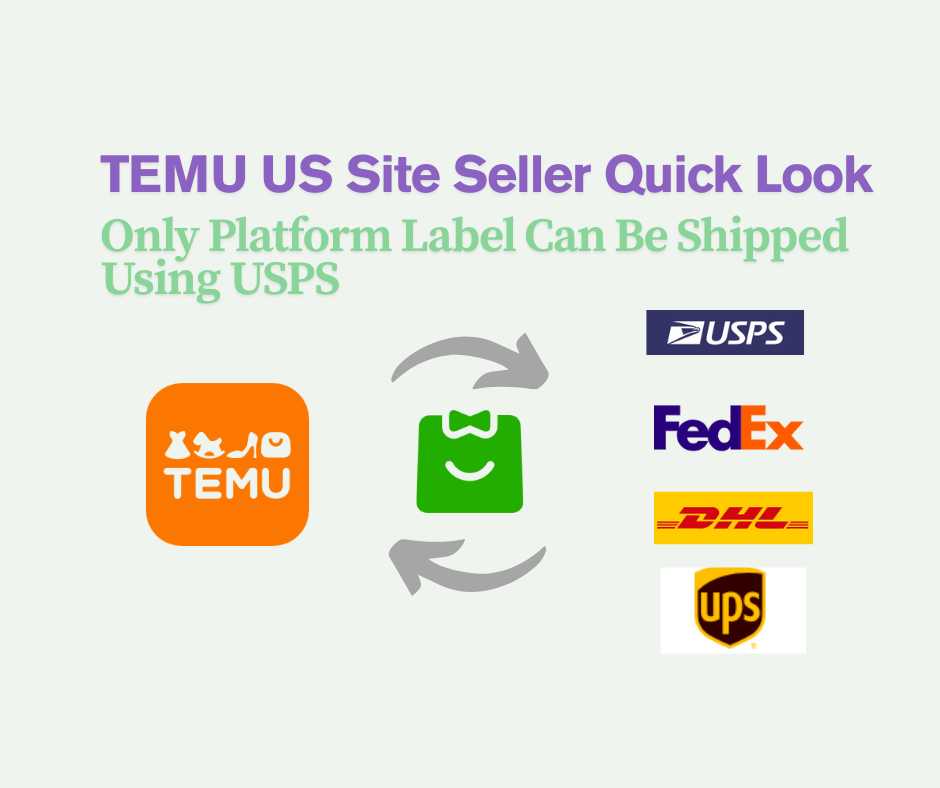TEMU US Site Seller Quick Look: Only Platform Label Can Be Shipped Using USPS
 By Amelia09 Apr,2025
By Amelia09 Apr,2025
In this highly competitive red sea of cross-border e-commerce, any minor change in platform rules is like dropping a huge stone into a calm lake, which is bound to cause waves. Recently, Temu has released a key new regulation for the USPS self-ship service in the US site, clearly requiring merchants to switch the shipping method to platform label mode. This change not only directly impacts the daily operation process of merchants but also reshapes the platform's logistics ecosystem at a deeper level, bringing an undeniable impact on consumer experience. Today, let's delve into the many details and profound significance behind this fulfillment order new regulation together.1. Background of the New Regulation: Strengthening Logistics Norms and Punishing Violations Severely
During Temu's vigorous transition from full custody to semi-custody mode, the importance of logistics management standardization has become increasingly prominent.
Previously, incidents of "running water orders" on the platform occurred frequently, causing a huge stir. Such phenomena mainly concentrated in the semi-custody seller group. Some unscrupulous merchants, driven by profit motives, shipped goods through the means of running water orders and technology orders, seriously disrupting the originally orderly logistics order of the platform, greatly damaging the legitimate rights and interests of consumers, and also having a negative impact on the platform's reputation.To completely and fundamentally eliminate such violations from the root cause, as early as February, Temu urgently issued a notice, clearly stating that it would severely crack down on the phenomenon of merchants using running water orders and technology orders for shipping. This time, the requirement to switch to platform labels for USPS shipments is a powerful measure to further strengthen the platform's logistics control. Through unified use of shipping labels, Temu can more accurately track logistics information, effectively guarantee the accuracy and timeliness of goods delivery, and lay a solid foundation for the healthy and sustainable development of the platform.
2. Comprehensive Analysis of the Advantages of Platform Label Processing on the Platform
2.1 Automatic Price Comparison and Order Placement for Cost Optimization
The platform label processing system on the platform features a powerful intelligent price comparison function. Based on the weight of the order package, it can automatically screen and compare the prices of available logistics channels. This intelligent operation means that merchants no longer need to spend a lot of time and effort manually calculating the prices of various logistics channels. The system will automatically identify the most cost-effective channel and complete the order placement process quickly. Moreover, merchants can flexibly configure custom logistics rules according to their own business needs and independently specify the last-mile delivery channel for shipment. While ensuring that the logistics service quality is not affected, this measure can minimize logistics cost expenditures to the greatest extent.
2.2 No Need for Appointment for Pickup, Significantly Improving Efficiency
In the previous USPS self-shipment mode, merchants often needed to complete the cumbersome appointment for pickup on their own. This process was not only cumbersome but also prone to delays in shipment due to unreasonable time arrangements. However, after adopting the platform labels processing, the cooperative warehouse will fully undertake the tasks of delivering or making appointment for pickup. Merchants only need to properly prepare the goods in advance and deliver them to the cooperative warehouse on time. This optimization measure greatly saves merchants' time and energy, making the shipment process more concise and smooth, and significantly improving overall operational efficiency.
3. Platform Platform Labels Impact on Sellers in Multiple Dimensions
3.1 Positive Impact
Enjoy Logistics Discounts: By using platform labels, merchants have the opportunity to enjoy the highest 6% tail-end discount offered by the cooperative warehouse's platform logistics services. This is undoubtedly an extremely attractive benefit for merchants who have long endured the pressure of logistics costs. It can effectively reduce operating costs and effectively expand profit margins.
Reduce the risk of violation: At the moment when Temu is vigorously rectifying the behavior of illegal delivery, switching to the platform's call-in order can help merchants significantly reduce the risk of tail-end fulfillment violations. By avoiding the use of illegal delivery labels, merchants can prevent severe penalties such as the entire store being removed from the platform and restrictions on cash withdrawal, effectively ensuring the stable operation of their stores.
Enhancing Store Image: Standardized and orderly logistics distribution and precise and reliable tracking of logistics trajectories can effectively enhance consumers' trust and satisfaction with the store. When consumers can grasp the transportation status of goods in real time and accurately, the shopping experience will be greatly optimized. This is beneficial for enhancing the store's reputation and repeat purchase rate, and is conducive to the sustainable development of the store in the long run.
3.2 Negative Impacts
Change in Operating Procedures Cost: Merchants need to log in to the seller center as soon as possible, carefully review the new SOP (Standard Operating Procedures), and adjust the shipping process strictly in accordance with the requirements. This means that merchants need to invest a certain amount of time and energy to learn and adapt to the new operation mode. In the short term, it may have an impact on shipping efficiency, and even some minor mistakes may occur due to lack of proficiency in operation.
Operational Cost Uncertainty: Some sellers have reported that the operation costs of overseas warehouses are relatively high. Although the platform claims that there will be no penalty for delayed platform labels, there is still a risk of fines for delayed delivery and false delivery in the actual operation process. This makes merchants face certain uncertainty in operational costs and requires more meticulous cost planning and management.
4. Besides USPS, what other logistics options does Temu offer?
The logistics providers that Temu cooperates with for self-shipping mainly include the following several:
UPS (United Parcel Service): As a well-known logistics industry giant worldwide, its business coverage is extensive, reaching over 220 countries and regions. It offers diverse transportation methods such as standard, express, and express delivery, which can fully meet the differentiated transportation needs of different customers.
FedEx: A leading enterprise in the logistics field, known for its fast and reliable transportation services. It supports domestic and international transportation businesses, and its vast transportation network can ensure that packages are safely and on-time delivered to the destination.
DHL Group: A global leading logistics service provider that has signed a cooperation memorandum with Temu and fully supports Temu's local operation in Europe, including the local-to-local model. It is expected that this model will eventually account for 80% of Temu's European sales.
5. Leveraging Tools to Efficiently Assist Fulfillment Orders
4Seller e-commerce erp has currently achieved connection with all the logistics providers supported by Temu that can be cooperated with. Merchants only need to authorize their logistics accounts to the 4Seller system to conveniently complete the purchase of waybills, which helps to quickly improve shipping efficiency.
6. Summary
The new regulation of Temu regarding the platform labels process of USPS self-fulfillment switching platform is a significant decision made by the platform to enhance its logistics management level and effectively safeguard consumers' rights and interests. For merchants, although they may encounter a series of challenges in the short term, from a long-term development perspective, a standardized and orderly logistics environment will strongly promote the healthy development of the platform and also create a fairer competitive environment for merchants. Only by actively adapting to the new regulation and promptly optimizing their own operational strategies can they gain a firm foothold in the rapidly changing e-commerce market and achieve better development.
- 09 Apr,2025
- 09 Apr,2025





